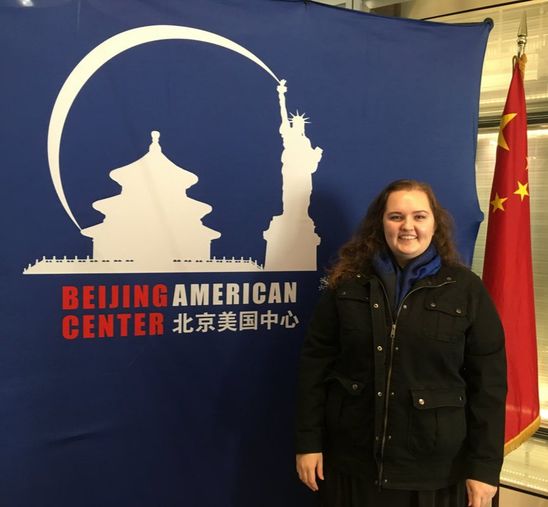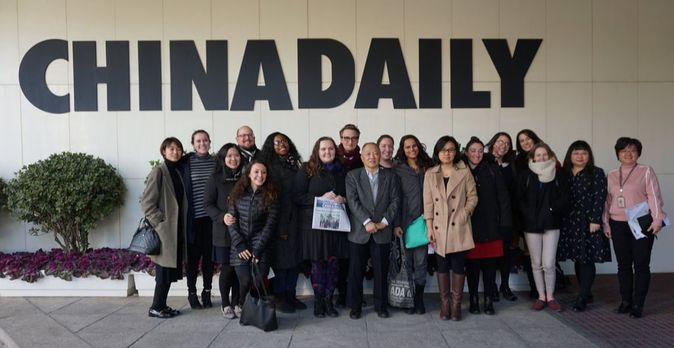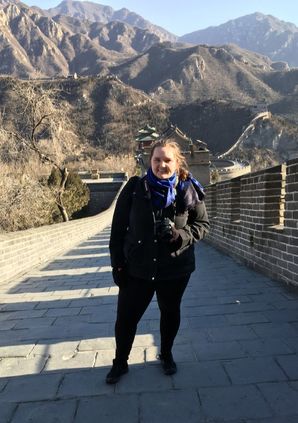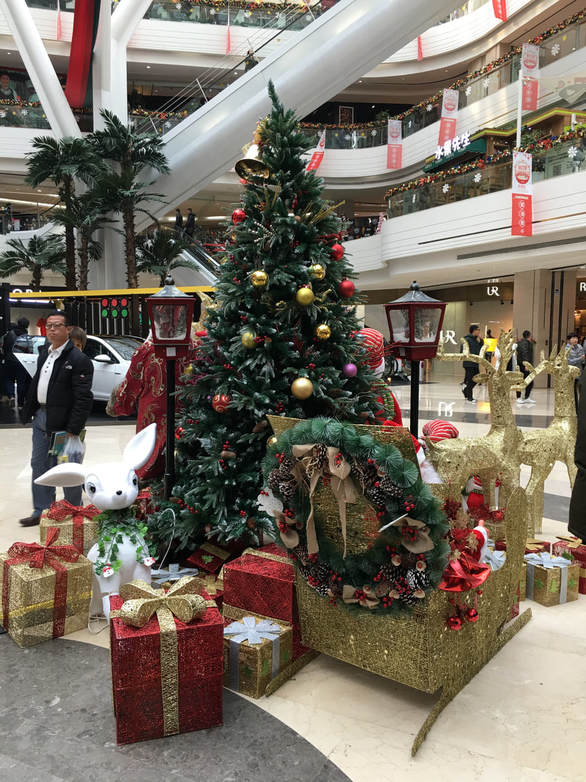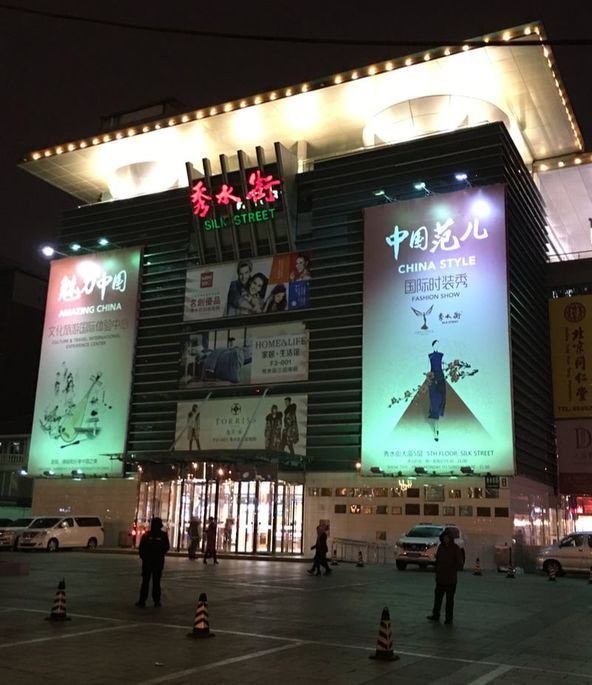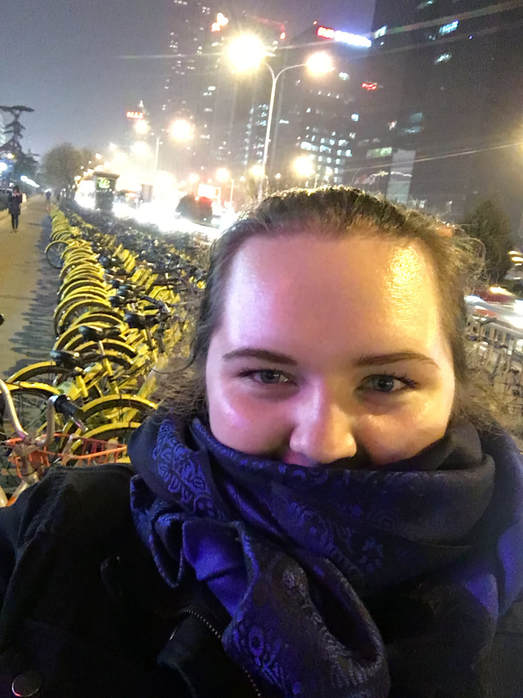|
US Embassy - Beijing Our first stop on our second full day in China was at the US embassy. I’ve rarely felt as privileged as I did when I stood outside and watched 500 Chinese people waited in lines with visa applications. Prior to arriving at the embassy, we’d been given strict guidelines to bring out passports. We’d even had to return to the hotel because one person forgot there’s. Instead, we bypassed the extremely long lines and walked directly into the embassy through a side security entrance. Inside we were run through a metal detector, but not once were our passports checked. I was the first student delegate inside and was able to speak to our host David, who happened to be a fellow ISU alum! He and I chatted about ISU, DC and Iowa for several minutes until everyone else arrived. He shared that the Chinese ambassador (aka Governor Terry Branstad) loves to talk about Iowa, especially with David; and that David was headed to a lunch meeting with the ambassador right after his meeting with us! China Daily Our second stop was lunch with the former editor-in-chief of the China Daily, Zhu Yinghuang. We would learn later that he is also the founding father of the paper’s online edition. This was a delightful lunch, especially because Mr. Zhu was an eloquent speaker who has decades of experience with Chinese media. Listening to his perspectives helped me further grasp the Chinese understanding about the role of journalism. After lunch, we took our shortest bus ride of the trip down the street to the China Daily offices. Best meeting ever! After working on a project analyzing China for a semester, I was quite familiar with China Daily’s work. Actually, going and speaking with their reporters was amazing! Again, it was fascinating to speak with Chinese journalists who work within the state-run platform about covering potentially controversial topics. One of my biggest takeaways from both meetings was that we cannot use Western definitions of journalism and the role of the media to understand Chinese media. The Chinese understanding of journalism’s purpose is very different than the American understanding (even in our tumultuous climate where opposite ends of the political spectrum disagree about the media). We learned that the China Daily English addition is specifically tailored to target a foreign audience – which makes sense because the majority of Chinese people do not speak English – but this goes beyond translating Chinese articles to English. Instead, the English addition of the China Daily is written for English speakers. Additionally, we learned that the articles in the print addition differ from the online addition and in essence are different papers. The China Daily meeting blew my mind in ways I’m still struggling to put on paper. It was an incredible experience and one that I would highly recommend if you are ever given the chance to visit their offices in Beijing. Second Alum of the Day! Our final stop of the day was at Caixin Media. Another media group based out of China that focuses on economic and financial news. At Caixin I met an American University alum and learned more about how non-state funded Chinese publications function under strict regulations. It was great to see how other AU students are using their degrees. Dinner with Mr. Wong Upon returning to the hotel, we were treated to a lovely dinner with Alan Wong, the executive director of the China-United States Exchange Foundation (our sponsor organization). The discussion was lively and informative. Even as I almost nodded off in my vegetarian paella, I asked him about Hong Kong’s transfer of sovereignty back to China and if he could compare and contrast with Taiwan. His insight was most insightful. Side note about this dinner: I was asked about my allergies (i.e. nuts) and then given a special dessert nut free! This was awesome because at most fancy restaurants I can never eat dessert because for some reason people think nuts are fancy. [For the record, they’re not.] But I appreciated the restaurant’s care and forethought in providing me safe and delicious food. Next post: Climbing the Great Wall! Institute of Public and Environmental Affairs Our first meeting in China was with an American woman working for a Chinese non-governmental agency in the field of environmental protection – the Institute of Public and Environmental Affairs. The meeting focused on the three environmental problems China is facing: air pollution, water pollution and soil pollution. The IPE is a unique organization in it specializes in collection public domain information through environmental records in an effort to increase transparency. One of the most interesting things was learning about how the Chinese government is supportive of this type of transparency because the Chinese government is heavily committed to decreasing pollution in China. Chinese Ministry of Foreign Affairs Next on our list, we met with our host organization: the Chinese Ministry of Foreign Affairs. During the meeting I specifically asked about Chinese foreign policy and the One Belt, One Road Initiative (OBOR) I had researched for my first semester as a graduate student. I enjoyed the project so it was doubly fun to continue my research in China as well as speak with members of the Chinese government about the project. Although, perhaps my favorite part of this meeting happened as we were departing. We were pointed to a wall of books and told to help ourselves. I picked out a large hard cover on the topic of Chinese vast collection of World Heritage sites. (Life update: my dream job is to work for UNESCO – so this 20-pound book was worth carrying around in my backpack for the rest of the trip.) Chinese Mall Following the meeting, we stopped for lunch at a mall. Again, Christmas explosion. Visiting places like a mall, which was similar to one I’d find in the States, was one of the tiny pieces that aided me in creating a more holistic view of China. Family Style Lunch I’m not sure I have ever eaten so much food. I kept saying, “I don’t know what this is but I’m putting it in my mouth!” Side story: I’m deathly allergic to tree nuts, so eating in China was a bit of a different experience for me. I’m usually fairly safe with vegetables and meats, but there were several dishes that our guides kept assuring me were peanuts (which I can eat) but I played it safe and avoided eating anything with nuts. This was made even more difficult as this was our first meal ‘family style’ with a lazy Susan in the middle of the table and all of the foods being passed around with their own sets of chop sticks. This type of communal meal means I had to remain ever vigilant if nuts were present to make sure the chock sticks didn’t move from dish to dish – which they did often. I use the same vigilance at buffets: if a dish with nuts is next to one without, but there is the possibility of a shared spoon, I will avoid both dishes. My allergy didn’t cause me any hardships at this meal; I was able to find plenty to eat. But having a severe allergy influenced my trip in ways I was just beginning to understand. Carnegie-Tsinghua Center for Global Policy Our final meeting was at the Carnegie-Tsinghua Center. Probably my favorite meeting of the day. We were able to tailor the conversation to our individual interests – which was particularly helpful for me because my interests lie beyond the traditional aspects of reporting and delve into the more creative aspects of journalism. I also appreciated learning about China from another new perspective – American, but Americans who are living in China. Motion Sickness After a long care ride back to the hotel, we collapsed for a short reprieve before heading to the buffet. I ate two spoon of chicken broth (or fish soup, basically zero idea what it was). My stomach was so upset from the long car ride through Beijing traffic. I had forgotten how carsick I get in vans. I know this sounds kind of silly. How could I forget I get carsick? But seriously, I can be on a boat, in huge waves, reading a book with no issues. Or I can hop on eight roller coasters in a row, or even in the backseat of a car for a long road trip – all with zero issues. But put me in a van and I’ll get motion sickness at the drop of a hat. This was the worst day of it. I took better precautions to avoid getting as sick as I did this night. But if you ever want to travel, like I do, it’s something to learn about your body before you spend hours trapped in Beijing traffic. Silk Street Market After ‘dinner’ my roommate, the third student from our university and I visited the concierge to pick up some really cool post cards and got directions to the Silk Market – the huge tourist trap that I couldn’t wait to visit! Despite the name, I did not see any real silk at the market. The three of us set out on our first adventure in China without translators or guides – after dark and in heavy levels of smog without our masks. Let me assure you, it was great fun! The market was only a brisk, if chilly, 10-minute walk from the hotel. I was able to test my rusty bargaining skills and picked up a much needed scarf! Prior to visiting Beijing, I’d read several other blogs about the Silk Market, but I didn’t find it as overwhelming as others had described. Although this could be because we went less than an hour before closing so there weren’t very many people around and we were mostly browsing rather than shopping. All said and done, it was a great second day in China – learning about Chinese perspectives from both a governmental agency and from Americans who have made their living in China. Day Three: Visiting the US embassy and meeting a fellow Iowa State alum – Go Cyclones! |
AuthorMy name is Hunter and this the blog of my worldwide adventures. The purpose of this blog is to show that you can be a traveler, not just a tourist. Archives
March 2019
Tags
All
|
Proudly powered by Weebly
